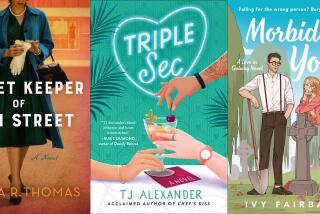Affecting Romantic Literary Venture From a Consummate Jokester
- Share via
Two authors recently have recorded unabridged versions of their work. The more interesting of the pair is the May-December romance depicted in “Shopgirl,” by Steve Martin (Simon & Schuster Audio; unabridged novella; three cassettes; four hours; $23; read by the author). A confident and astute comedy of West Coast manners, it begins with a description of Mirabelle, a saleswoman at Neiman Marcus in Los Angeles who lives alone with her two cats, one of which is always hiding. Mirabelle sells gloves that no one buys, consequently spending much time leaning on the counter, staring into space. She fills her nights by drawing “dead things” and gets through her days with the help of prescription drugs.
Ray Porter is considerably older, a millionaire with homes in Seattle and Los Angeles. He finds Mirabelle charming; she likes him well enough. The two embark on a romance that neither fully comprehends.
Martin brings two other characters into the story to accentuate his themes of vacuity and isolation. Lisa, a driven sexpot who uses her gender to ensnare men, is the most audacious and humorous character in this brief tale. She simply knows no boundaries. Jeremy, a rather hapless young man who eventually ripens into a successful businessman, grows emotionally only after ingesting dozens of self-help audiobooks.
A general lack of standards surrounds these characters, which brings humor to the audiobook, as well as a very dark edge. Martin does not easily traverse that territory, causing an imbalance in the narrative.
Nevertheless, his writing is taking him to new and intriguing places, most of which are worth visiting. He astutely describes his characters’ lifestyles, lays them bare with clever observations and then sums them up with an economy of words that is breathtaking. For that we can forgive him minor missteps.
The novella’s brevity well suits the medium, as one can finish the story during one long car trip. Be forewarned: Martin does not shy away from graphic language, and the material is very adult-oriented.
The author is a very pleasing reader. He has a smooth, cultivated manner and a low, rich voice. He can deliver a barb without ever sounding impertinent and is sometimes so deadpan that his shrewd insights sneak up on you a heartbeat after they have been made. Be prepared to rewind through some laughter.
*
Though Barbara Kingsolver probably does not have a bad book in her, she did have a disappointing one. “Prodigal Summer” (Harper Audio; unabridged fiction; 10 cassettes; 15 hours; $42.95; read by the author) just does not live up to the high standards set by her last novel, “The Poisonwood Bible.”
The story, which takes place in a tobacco-growing valley of southern Appalachia, consists of three different narratives, all linked by family ties and romantic themes.
Lusa Maluf is a city girl turned farmer. Recently widowed, she is struggling to make a place for herself in a new home that feels foreign. Deanna Wolfe is a reclusive wildlife biologist living alone in an isolated mountain cabin. She embarks on an unexpected affair after meeting the considerably younger Eddie Bondo while making her rounds. Lastly, there are the elderly neighbors, Nannie Rawley and Garnet Walker, who feud about the use of pesticides.
While Kingsolver is well versed in natural law, she so overstates that knowledge that the novel becomes didactic. There are also too many similarities, romantic elements aside. It wears thin that women are always the ones arguing for natural gardening and forestry. Often their dialogue is simply a variation on the same opinion. And even if you like what she has to say, that repetition becomes tiresome.
Kingsolver offers more surprises as a narrator. At first her voice sounds rather thin and girlish. But as you listen, you can hear the steel beneath that soft, countrified cadence. The author’s voice has a lovely hint of the country to it. She increases those rural tones for different accents, correctly stressing the pretty singsong inflections of Appalachia during dialogue.
The clear sounds of chirping birds are used at the beginning and end of each tape and to break up sections. This works particularly well for this production, as the birds remind us of our proximity to the natural world. However, on a few occasions they continue chirping even as Kingsolver speaks, which is distracting.
*
Rochelle O’Gorman reviews audio books every other week. Next week: Dick Lochte on mystery books.
More to Read
Sign up for our Book Club newsletter
Get the latest news, events and more from the Los Angeles Times Book Club, and help us get L.A. reading and talking.
You may occasionally receive promotional content from the Los Angeles Times.






